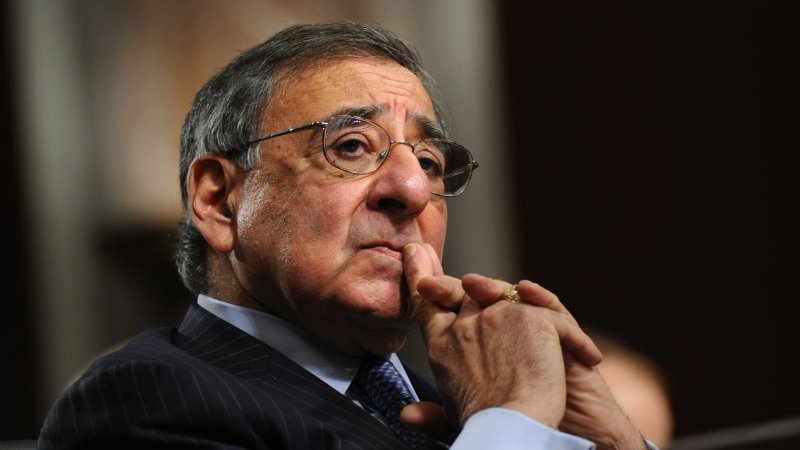Defense Secretary Leon Panetta testifies before a Senate Armed Service Committee hearing on the attack on the U.S. facility in Benghazi, Libya on Capitol Hill in Washington, DC on February 7, 2013. UPI/Kevin Dietsch |
License Photo
WASHINGTON, Feb. 6 (UPI) -- Defense Secretary Leon Panetta said Wednesday $46 billion in U.S. military budget cuts would "degrade our ability to respond to a crisis."
Speaking at Georgetown University in Washington, Panetta said the impending automatic cuts, or sequestration, would result in "a serious disruption in defense programs and a sharp decline in our military readiness."
He said 46,000 department jobs would be at risk, as many as 800,000 civilian workers could be furloughed for as long as 22 days, and Army combat brigade readiness would be compromised by cutting back on training, shrinking naval operations and a reduction in Air Force flying hours and weapons systems maintenance.
"This is not a game. This is reality," Panetta said. "These steps would seriously damage a fragile American economy and they would degrade our ability to respond to a crisis precisely at a time of rising instability across the globe."
His comments sought to increase pressure on members of Congress to reach agreement on deficit-reduction steps to avoid the spending cuts that were included in a 2011 deal to raise the federal debt ceiling, CNN reported Wednesday.
Congressional Republican leaders rejected U.S. President Barack Obama's call for new spending cuts and "tax reforms" to head off looming across-the-board cuts.
House Speaker John Boehner, R-Ohio, and Senate Minority Leader Mitch McConnell, R-Ky., both said Obama's proposal that Congress pass "a balanced mix" of limited spending cuts and tax changes to delay the automatic cuts was a non-starter.
Without any action, the cuts, amounting to $1.2 trillion over a decade, are to take effect March 1. They had been scheduled to go into effect Jan. 2 but Congress delayed them in the last-minute deal raising tax rates on the wealthiest Americans.
"Republicans have twice voted to replace these arbitrary cuts with common-sense cuts and reforms that protect our national defense," Boehner said in a statement. "We believe there is a better way to reduce the deficit, but Americans do not support sacrificing real spending cuts for more tax hikes."
McConnell said in a statement Obama, "who first proposed the sequester, and who just last year claimed that the sequester 'will not happen,' now wants to 'delay' the sequester for a few months with more permanent tax hikes at a time when American families are already feeling the pinch of the Obama economy."
Obama said during a debate in the fall with Republican presidential nominee Mitt Romney the sequester "will not happen." On Tuesday, when he proposed the delay, he said it "doesn't have to happen."
House Budget Committee Chairman Rep. Paul Ryan, R-Wis. -- the GOP vice presidential nominee in 2012 -- said in January "these sequesters will happen" and blamed Democrats for opposing Republican "efforts to replace those cuts with others and they've offered no alternatives."
Congressional Republicans blame Obama for first proposing the automatic cuts, The New York Times and The Washington Post said, although Congress passed the cuts, which affect domestic and defense spending, in the summer of 2011 as part of a deal to raise the nation's debt ceiling.
Republicans are warming to the idea of letting the sequester go forward because it at least guarantees sharp spending cuts, the Post said.
Sen. Barbara Mikulski, D-Md. -- who heads the Senate Appropriations Committee -- criticized the White House after she learned the administration had instructed heads of domestic agencies not to talk publicly about the sequester without getting their talking points approved in advance by the Office of Management and Budget.
"It's been under a gag order," she told Politico. "I'm against gag rules."
White House officials said the reason for the directive was to coordinate messaging and avoid "causing mass confusion" among federal employees.
Mikulski said she will hold a hearing and invite officials from OMB and several Cabinet departments -- including Treasury, Health and Human Services and Homeland Security -- to
discuss the consequences of across-the-board spending cuts on their departments.
Obama said Tuesday Congress should delay the automatic cuts for several months to give lawmakers time to negotiate a full deficit-reduction package that permanently resolves the sequester's threat.
"If Congress can't act immediately on a bigger package, if they can't get a bigger package done by the time the sequester is scheduled to go into effect, then I believe that they should at least pass a smaller package of spending cuts and tax reforms that would delay the economically damaging effects of the sequester for a few more months until Congress finds a way to replace these cuts with a smarter solution," Obama said in the White House briefing room.
"There is no reason" to put at risk "the jobs of thousands of Americans" that would be lost if sequestration goes into effect, Obama said.
The president said the economy had begun to recover, but he said persistent clashes over taxes and spending threatened to delay or derail it.
"We've made progress. And I still believe that we can finish the job with a balanced mix of spending cuts and more tax reform," Obama said.
He didn't say what spending cuts and tax adjustments he wanted. He has often said cuts in spending must be balanced with new tax revenue by closing loopholes for wealthy Americans and for the oil and gas industries, which have special tax advantages.















